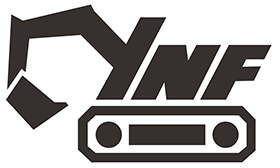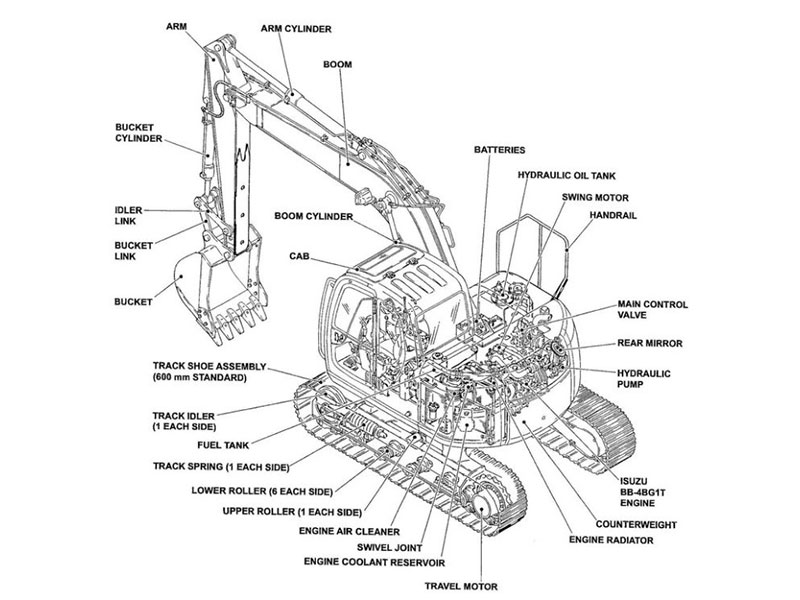
Efficiently finding the right parts for your excavator can save you time and money. Using a link-belt excavator parts lookup tool ensures you locate compatible components quickly. Regular maintenance becomes easier when you track your machine’s condition and keep an inventory of frequently worn-out parts. Neglecting these steps can lead to downtime and reduced performance. For example, failing to monitor the undercarriage or maintain a machine log often results in ordering the wrong parts. By mastering these tools, you can keep your excavator running smoothly and avoid costly mistakes.
Key Takeaways
-
Use smart search tools to quickly find the right parts. This saves time and avoids ordering the wrong items.
-
Always have your excavator’s model and serial numbers ready. These details are important to find parts that fit correctly.
-
Update your list of commonly used parts often. This helps avoid delays and keeps your excavator working well.
-
Use mobile apps and online catalogs to find parts anywhere. This makes it easy to manage repairs in the field or office.
-
Use saved searches and alerts for restocked parts. These tools make finding parts easier and keep you updated.
Overview of Link-Belt parts lookup tools in 2026

Key features of modern link-belt excavator parts lookup tools
Advanced search algorithms for precise results
Modern link-belt excavator parts lookup tools use advanced search algorithms to deliver accurate results. These algorithms allow you to search by part number, keyword, or category, ensuring you find the exact OEM or replacement parts you need. Whether you’re looking for rebuilt parts or new replacement parts, these tools streamline the process by filtering irrelevant results and saving you time.
Real-time inventory updates for OEM and replacement parts
Real-time inventory updates are a game-changer for sourcing heavy equipment parts. These updates ensure you know the availability of OEM parts, aftermarket parts, or rebuilt parts instantly. This feature minimizes downtime by helping you plan your orders effectively. You can also track stock levels for common parts to replace, ensuring you never run out of essential components.
Compatibility with mobile and desktop platforms
The compatibility of these tools with both mobile and desktop platforms makes them accessible wherever you are. Whether you’re in the field or at the office, you can use these tools to locate replacement parts or aftermarket components quickly. This flexibility ensures you stay productive and reduces delays in maintaining your excavator.
Types of lookup tools available for excavators
Online catalogs for quick access
Online catalogs, such as the NSN parts catalog by ASAP Semiconductor, provide detailed information about parts of an excavator. These catalogs let you explore part numbers, submit requests for quotes, and even specify delivery timelines. They cater to various needs, including those requiring expedited shipping for urgent repairs.
Dealer-specific systems for personalized support
Dealer-specific systems offer tailored solutions for your excavator. These systems provide personalized support, ensuring you find compatible OEM or aftermarket parts. They also help you navigate through options like used parts or rebuilt parts, making it easier to maintain your equipment.
Mobile apps for on-the-go parts lookup
Mobile apps bring convenience to your fingertips. These apps allow you to search for replacement parts, check availability, and place orders while on-site. With features like saved searches and notifications for restocked items, mobile apps make managing your excavator’s maintenance more efficient.
Importance of using these tools for excavator maintenance
Reducing downtime with faster part identification
Using these tools helps you identify parts quickly, reducing downtime. Having spare parts on hand ensures your excavator remains operational, boosting productivity. Regularly inspecting components like the undercarriage and engine also prevents costly repairs.
Ensuring compatibility with your excavator model
These tools help you verify compatibility with your excavator model. By cross-checking part numbers and specifications, you avoid ordering incompatible components. This accuracy ensures your machine operates at peak performance, extending its lifespan.
Tip: Maintaining a machine log and inventory of frequently used parts can save you time and money during repairs.
Step-by-step guide to using Link-Belt parts lookup tools effectively

Preparing for your search
Gather essential details like model and serial numbers
Before starting your link-belt excavator parts lookup, gather the necessary details about your machine. The model and serial numbers are critical for identifying the correct OEM or replacement parts. These numbers ensure you locate components that match your excavator’s specifications. Without this information, you risk ordering incompatible parts, leading to delays and additional costs.
To streamline your search, maintain an inventory of commonly worn parts. Regularly inspect the undercarriage for signs of wear and tear. Create a machine log to track the condition of parts like the engine, hydraulic systems, and couplings. These steps help you stay prepared and reduce downtime during repairs.
Identify the part category (e.g., hydraulic, engine, or couplings)
Knowing the category of the part you need simplifies the lookup process. Determine whether you require hydraulic components, engine parts, or couplings. For example, if you notice oil leaks, you might need hydraulic cylinder seal kits. Identifying the category narrows your search and ensures you find the right replacement parts quickly.
Navigating the lookup tool
Use filters to refine your search for excavator parts
Filters are essential for refining your search. Use them to sort by part type, compatibility, or availability. For instance, if you need rebuilt parts or aftermarket options, apply the relevant filters to exclude OEM parts. This approach saves time and ensures you focus on the most suitable options for your excavator.
Search by part number or keyword for accuracy
Searching by part number or keyword provides precise results. If you have the part number, enter it directly into the lookup tool. This method eliminates guesswork and ensures you find the exact replacement parts. Keywords like “used parts” or “rebuilt parts” can also help you locate specific components quickly.
Verifying part details
Cross-check compatibility with your excavator
Always verify that the part is compatible with your excavator model. Cross-check the specifications, including dimensions and material requirements, to avoid errors. This step ensures the replacement parts function correctly and maintain your machine’s performance.
Review specifications and images of replacement parts
Examine the specifications and images provided in the lookup tool. Look for details like size, material, and design to confirm the part meets your needs. Reviewing images helps you identify visual differences between OEM and aftermarket parts, ensuring you make an informed decision.
Tip: Double-checking compatibility and specifications prevents costly mistakes and ensures your excavator operates efficiently.
Completing your order
Add parts to your cart or wishlist
Once you identify the correct excavator components using the link-belt excavator parts lookup tool, add them to your cart or wishlist. This step ensures you don’t lose track of the selected items while reviewing other options. Many lookup tools allow you to save parts for future reference, which is especially helpful if you frequently order the same components.
Double-check the items in your cart before proceeding. Verify the part numbers, quantities, and specifications to avoid errors. Some platforms also display estimated delivery times and shipping costs at this stage. Use this information to plan your maintenance schedule effectively.
If the lookup tool offers a wishlist feature, take advantage of it. Save parts that you may not need immediately but want to purchase later. This feature helps you stay organized and ensures you can quickly access these items when required.
Pro Tip: Regularly update your wishlist with frequently used parts to streamline future orders and reduce downtime.
Contact a dealer for additional support if needed
If you encounter any issues or have questions about the parts, reach out to a dealer for assistance. Dealers often have in-depth knowledge about excavator models and can guide you in selecting the right components. They can also provide insights into OEM, aftermarket, or rebuilt options based on your needs.
Many lookup tools include contact details for authorized dealers. Use these resources to clarify doubts about compatibility, availability, or pricing. Some dealers also offer technical support, helping you understand installation procedures or maintenance tips.
When contacting a dealer, provide them with your excavator’s model and serial numbers. This information helps them identify the exact parts you need. If you’re unsure about a specific component, share images or descriptions to get accurate recommendations.
Note: Building a good relationship with your dealer can lead to better support and access to exclusive promotions or discounts.
Tips for optimizing the link-belt excavator parts lookup process
Save time with advanced features
Use saved searches for frequently needed parts
Saved searches can significantly reduce the time you spend looking for replacement parts. Many lookup tools allow you to save frequently searched items, such as oem or aftermarket components. This feature ensures you don’t have to re-enter the same details repeatedly. For example, if you often search for hydraulic seals or engine components, saving these searches helps you access them instantly.
Interactive diagrams and visual aids also enhance efficiency. Tools like the PartsTech Visual Search Suite provide 360-degree product views and full-vehicle diagrams. These features help you quickly identify parts of an excavator, ensuring accurate orders. On average, this can save you about 15 minutes per repair order, boosting productivity and reducing downtime.
Enable notifications for restocked or discounted items
Notifications keep you informed about restocked or discounted items. Enabling this feature ensures you never miss out on essential oem or aftermarket parts. For instance, if you’re waiting for rebuilt parts or used parts to become available, notifications alert you immediately. This proactive approach helps you plan repairs and maintenance without delays.
Many lookup tools also notify you about promotions, allowing you to purchase high-quality components at reduced prices. These savings add up over time, making your excavator maintenance more cost-effective.
Leverage support resources
Utilize live chat or customer support for assistance
Live chat and customer support are invaluable when you encounter issues during your search. These resources connect you with experts who can guide you in selecting the right replacement parts. Whether you need help identifying oem components or verifying compatibility, support teams provide quick and accurate answers.
Some platforms also offer technical advice on installing parts or maintaining your excavator. This assistance ensures you make informed decisions, reducing the risk of ordering incompatible items.
Refer to user manuals or guides for additional help
User manuals and guides are excellent resources for understanding your excavator’s requirements. These documents often include detailed information about oem and aftermarket parts, helping you identify the correct components. For example, if you’re unsure about a specific coupling or seal kit, the manual can clarify its specifications.
Referring to these guides also helps you understand how to use lookup tools effectively. By following the instructions, you can streamline your search and avoid common mistakes.
Keep your excavator information updated
Maintain a record of your machine’s details
Keeping a detailed record of your excavator’s model, serial number, and maintenance history is crucial. This information ensures you find compatible replacement parts quickly. For example, knowing which filters or gaskets need regular replacement helps you plan ahead.
Maintaining an inventory of low-cost components, such as seals or couplings, also prevents prolonged downtime. Being prepared with spare parts ensures minor issues don’t escalate into major problems.
Regularly update your lookup tool profile
Updating your lookup tool profile with accurate machine details improves search accuracy. Many tools use this information to suggest compatible oem or aftermarket parts automatically. Regular updates also help you anticipate maintenance needs, reducing downtime and overall costs.
For instance, storing details about your excavator’s engine or hydraulic system allows the tool to recommend specific rebuilt parts or used parts. This proactive approach ensures your machine operates efficiently and extends its lifespan.
Tip: Staying organized with updated records and profiles not only saves time but also enhances the quality of your maintenance efforts.
Common mistakes to avoid when using parts lookup tools
Searching without accurate excavator details
Importance of knowing your model and serial number
You must know your excavator’s model and serial number before starting a parts lookup. These details are essential for identifying the correct components. Without them, you risk wasting time searching for parts that may not fit your machine. Always keep this information handy to streamline your search process.
Risks of ordering incompatible parts
Ordering parts without verifying compatibility can lead to costly mistakes. Incompatible components may not function properly, causing delays in repairs. This can also damage your excavator, leading to more extensive maintenance needs. Double-checking your machine’s details ensures you avoid these risks and keep your equipment running efficiently.
Ignoring part specifications
Overlooking dimensions or material requirements
Ignoring specifications like dimensions or material requirements can result in ordering the wrong parts. For example, a hydraulic seal kit with incorrect measurements will not fit properly, leading to leaks. Always review the specifications provided in the lookup tool to ensure the part meets your excavator’s requirements.
Failing to verify part numbers
Part numbers are crucial for accuracy. If you fail to verify them, you might end up with a component that doesn’t match your machine. Cross-check the part number with your excavator’s manual or consult a dealer to confirm its compatibility. This step saves time and prevents unnecessary expenses.
Using outdated lookup tools
Risks of relying on old catalogs or unsupported apps
Using outdated lookup tools can lead to errors. Old catalogs may not include the latest parts or updated specifications. Unsupported apps may lack real-time inventory updates, causing delays in finding the right components. These issues can disrupt your excavator’s maintenance schedule.
Benefits of switching to updated systems like YNF Machinery’s platform
Switching to modern lookup tools, such as YNF Machinery’s platform, ensures you access accurate and up-to-date information. These tools provide real-time inventory updates and advanced search features, making it easier to find compatible parts. By using updated systems, you reduce downtime and improve your excavator’s performance.
Tip: Always use the latest lookup tools to ensure accurate results and efficient maintenance planning.
Benefits of mastering Link-Belt parts lookup tools
Improved efficiency and reduced downtime
Faster identification of OEM and replacement parts
Mastering Link-Belt parts lookup tools allows you to identify OEM and replacement parts quickly. These tools streamline the process by offering advanced search features and real-time inventory updates. For example, the Inventory app ensures you always have preventive maintenance parts in stock. This readiness eliminates delays in repairs and keeps your excavator operational.
Additionally, the Work Orders app simplifies communication by creating immediate work orders. Technicians receive all necessary details promptly, reducing the time your excavator remains out of service. Proactive monitoring through fleet care reports also helps you schedule maintenance before issues arise, preventing unexpected downtime.
Minimizing delays in repairs or maintenance
Efficient parts lookup tools minimize delays by ensuring you find the exact replacement parts when needed. Whether you require rebuilt or aftermarket components, these tools help you locate them without wasting time. By reducing downtime, you can maintain productivity and meet project deadlines.
Cost savings through accurate searches
Avoiding unnecessary purchases
Accurate searches prevent you from buying unnecessary parts. By using filters and verifying compatibility, you ensure every purchase aligns with your excavator’s requirements. This precision reduces waste and saves money over time.
Taking advantage of promotions or discounts
Many lookup tools notify you about promotions or discounts on OEM, aftermarket, or used parts. These savings add up, especially when purchasing high-quality components like hydraulic seals or couplings. Staying informed about discounts helps you manage costs effectively.
Enhanced confidence in maintaining your excavator
Ensuring peak performance with high-quality parts
Using high-quality parts ensures your excavator operates at peak performance. Superior-grade components, such as hydraulic couplings, prevent leaks and maintain efficiency. Advanced engineering in these parts also improves fuel efficiency and meets environmental standards.
Building long-term reliability with tools like YNF Machinery’s excavator couplings and seal kits
Investing in reliable tools like YNF Machinery’s excavator couplings and seal kits enhances your machine’s longevity. These products withstand tough conditions, reducing the risk of breakdowns. High-quality spare parts also lower maintenance costs and improve overall functionality, ensuring your excavator remains dependable for years.
Tip: Prioritize quality over cost when selecting replacement parts to maximize your excavator’s reliability and performance.
Mastering link-belt excavator parts lookup tools in 2026 ensures your excavator stays operational with minimal downtime. By understanding the features of these tools and following the step-by-step guide, you can locate oem or replacement parts efficiently. Avoiding common mistakes, like ordering incompatible components, saves you time and money. Tools like YNF Machinery’s platform simplify the process, offering reliable solutions for your excavator’s maintenance. With these strategies, you can keep your equipment running smoothly and extend its lifespan.
FAQ
How do I find the correct part for my excavator?
Use the model and serial numbers of your machine to search in the lookup tool. These details ensure you locate compatible parts quickly. Always cross-check specifications like dimensions and material to avoid errors.
Can I use aftermarket parts instead of OEM parts?
Yes, aftermarket parts can be a cost-effective alternative. Ensure they meet your excavator’s specifications and quality standards. Verify compatibility through the lookup tool or consult a dealer for guidance.
What should I do if I can’t find a part in the lookup tool?
Contact a dealer or customer support for assistance. Provide your excavator’s details, including model and serial numbers. They can help you locate hard-to-find parts or suggest alternatives.
How often should I update my lookup tool profile?
Update your profile whenever you acquire a new machine or replace major components. Keeping accurate records ensures the lookup tool suggests the right parts for your excavator.
Are hydraulic cylinder seal kits easy to install?
Yes, most hydraulic cylinder seal kits are designed for easy installation. Follow the instructions provided or consult your user manual. If unsure, seek help from a professional to avoid damaging your excavator.





